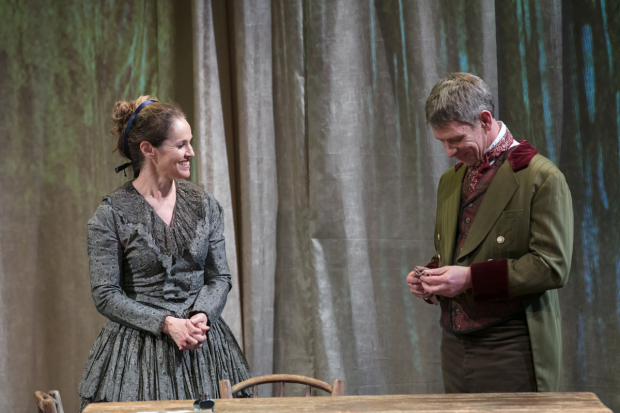Rules of Seconds

(© Grettel Cortes Photography)
The words "human," "gentlemen," and "rules" are peppered throughout John Pollono's Rules of Seconds, an exploration of the brutality of duels in the 19th century. There may be many rules in dueling, but there's nothing human or gentlemanly involved in shooting each other because of a tiff. Both childish and deadly, the custom is looked upon with no respect in Pollono's play, brought to the LATC by the Latino Theater Company and the Temblors. Directed by Jo Bonney, this shrewd play forces the audience to ponder the idiocy of man's actions. The cast, led by television star Amy Brenneman, is stellar.
Duels were an opportunity for civilized men to more or less commit sanctioned murder. Because there are so many rules and procedures, it had nobility that shrouded it. The play is set in 1855, when a noble European émigré challenges a weak young man to a duel because he accidentally spilled tea on his priceless boots. Walter Brown (Jamie Harris) wants blood for this effrontery, and it's no coincidence that the mother of simpleminded offender Nathaniel Leeds (Matthew Elkins) has a past with Mr. Brown. Mrs. Leeds (Brenneman) uses her womanly wiles in an attempt to bring sense to the man demanding her son's head, but only this legalized death march will satisfy the man. Nathaniel employs his estranged younger brother, James (Josh Helman) to act as his second, but there is no doubt that this cowardly man-child, whose hands shake and voice trembles, is no match for the master marksman Mr. Brown.
Pollono's witty writing evokes Irish wunderkind writer Martin McDonagh (The Beauty Queen of Leenane and The Lieutenant of Inishmore) by using bitter humor and vivid monologues to mock mankind's propensity to use pomposity in order to cover his insecurity. Brown's speech about meeting Mrs. Leeds in the past is particularly gripping and visual. Like McDonagh, Pollono also employs sick humor about death and brutality. Pollono uses the word "gentlemen" with dripping sarcasm as the most revered man in the play is racist, misogynistic, and classist.
Director Bonney allows the language and familiarity of modern times (the f-word is used liberally) to clash with the prim setting of pre-Civil War America. Bonney has blood squirt all over the stage to hammer home the senselessness of these legal crimes.
Brennemen is insightful as the strongest character in the play, forced to step aside because she's a woman. Though she allows the men to condescend, she is the wise one, the voice of reason, and the evener of the scales. Elkins is a bag of hand tics and introversion. Though a large man, he almost sinks into his own frame. Harris broadly plays Mr. Brown as a self-made master of the universe who considers everyone around him insects. His voice oozes with arrogance and disdain.
Andrew Lees, playing two characters — a foulmouthed footman and a German referee — hilariously bounces dialogue off Damu Malik, particularly during a second act segue where two old friends discuss what's bubbling underneath. As Nathaniel's more heroic brother, Helman projects confidence and a deep-seated compassion underneath the cockiness. As the only other woman in control, while the men act like schoolyard thugs, Jen Pollono shines. With fiery Irish instincts, her Hannah the maid is the play's heart and soul.
Stephanie Kerley Schwartz's costumes visually illustrate the class and gender divisions between the characters; Brennemen's simple sundress is simultaneously youthful and seductive.
The male animal is a supercilious creature with such a fragile ego that any minor offense to his honor must be blown beyond proportion. Though the method of dueling outlined in Rules of Seconds has been outlawed, anyone who thinks that men in power no longer use killing as a mode to pump up their own impotence has not been paying attention. The rules may have changed, as well as the weapons, but the consequences have not, making the play all the more timely.











